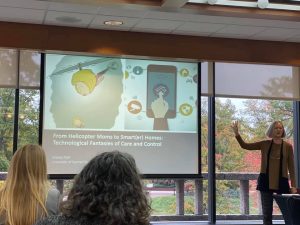
This spring, a new humanities course, Race and Technology, will explore the role of race in the production, consumption, and representation of technology. The course explores how new and emerging technologies—from dating apps to robots–produce racial identities and how they may be used to reproduce and also resist racism.
Students will help build a class database of examples of new and emerging technologies for analysis. Topics to be explored include:
- Technologies of looking (facial recognition) and listening (Alexa),
- Technologies of self-presentation (Instagram) and intimacy (Grindr, SoulSwipe),
- Biomedical (23 & me) and reproductive technologies (surrogacy), and
- Technologies for work (zoom) and for leisure (role playing games).
Students will also collaborate in building a database of cultural representations of technology in film, music, literature and so on (think HBO’s Westworld or Janelle Monae’s Dirty Computer). Reading and research throughout the term will culminate in a student conference where students will share their findings on race and technology in the form of hyperlinked essays, websites, blogs, vlogs, podcasts, photovoice or other creative online projects.
“This new course is an outgrowth of my research on the whitewashing (and feminizing) of surveillance technologies, the haunting of social robotics by the colonial past, and the ways in which technologies of care both address and perpetuate precarity in the present,” Park notes. Samples of Park’s public facing work on these topics can be found at In Media Res and at e-carity, a project co-founded with Mumtaz Afreen, a recent UCF graduate.
Race and Technology will be listed as HUM4932 for Spring semester and will be changed to HUM4831 for subsequent semesters. The course is open to juniors and seniors from both Humanities and STEM disciplines. Interested students who do not meet the prerequisites should contact Park at Shelley.Park@ucf.edu to discuss their interest.